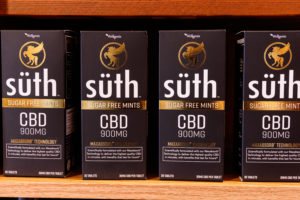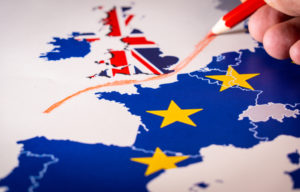While the U.K. CBD industry desperately seeks clarity on regulations, the politically time-consuming machinations of Brexit will prevent any serious progress until 2020, says a leading industry figure.
Blair Gibbs, Policy Lead for the Centre For Medical Cannabis (CMC) was speaking to CBD Testers at last week’s Europe CBD Expo in London. The key issues facing the U.K. CBD industry, right now, is whether the Government, and its regularity agency the Food Standards Agency (FSA), will press ahead with implementing the EU’s Novel Food directive.
Brexit Blues
“Discussions at senior level are taking place, at pace, across Whitehall – not just in the FSA – the discussions also involve the Home Office, The NHS (National Health Service) and Department for Environment, Food, and Rural Affairs (DEFRA), and there is clearly a recognition that the regulation is not where it should be.
“Will there be a single co-ordinated statement by all three departments? Will they send FSA into battle and give them the resources to do the job Well, the disappointing reality is that Brexit has so consumed the oxygen in the U.K. political realm, there is not the political attention to policy-making resources being devoted to this issue. And don’t expect any significant changes in the next six months.”
Mr Blair believes that if the U.K Government was to seek implementation of the European Union’s Novel Food directive it would suffer a backlash.
What Is A Proportionate Response?
“Personally I don’t think the Novel Food regime is workable for the U.K. CBD markets as it exists, today. Three years ago, then yes. Then it was less than one tenth of the size it is now,” says Mr Blair. He continued, “You could have argued that a change like that backed up by proper, clear regulations, communicated to the industry and with enforcement, could have set the benchmark and helped companies achieve that standard, but we are, where we are – and it is now, very different.

Novel food regulations would have been easier to establish when the market was smaller
“The FSA has said it will act in a proportionate way, and the discussions now are on the subject of what is proportionate? We currently have this grace period and if a proportionate response is to support a company making a Novel Food application during this period, then that it gives a clear pathway for companies who want to be compliant and we would support that.
“What the regulator is saying is that EU regulations are law in the U.K., and must be enforced and Trading Standards Officers are under a duty to seize and close down CBD businesses wherever they find them. But we are not seeing that happening, and if that is the intention then the regulator will need much more resources to do that job.
1.3m CBD Users Is A Large Block Of Voters
“Speaking frankly, it will also need a lot of political cover from politicians and minsters to take that course. There are 1.3m regular CBD users in the U.K. that is a very large base of consumers, and voters, who won’t necessarily take kindly to their products being outlawed. Quite apart from the economic impact on the companies creating revenues and jobs in the U.K.
“In reality, these regulations need to be complied with, but first of all we need the regulators to tell the industry – and ultimately consumers – what is lawful and what is proportionate in terms of Novel Food.”
He described the current European impasse on Novel foods as a ‘phoney war’. “What we have is a change in the law determined by a political vote in Brussels that has implications on the ground for companies in the U.K., in an industry which is now growing, is very important, and is relied upon by many consumers, but there is an apparent reticence to implement that law change by enforcement.
“If, and when, it does come it will create a shock for the CBD market. The best CBD companies are aware of what Novel Food means for them and there are companies actively pursuing a Novel Food application on the grounds that is the requirement, as it stands today, and even if it changes in the future they should ensure compliance with the law as it exists, today.”
Possible Brexit Bonus
Looking beyond Brexit Mr Gibbs sees immense potential for the British cannabis industry if the U.K. leaves the EU.

Brexit is complicating the CBD situation in EU
“There is a better way to proceed and devise something fit for the U.K. based on a less restrictive, more innovative third way for cannabinoid medication.
“At the moment there is not the appetite to do that, but outside the EU, like Switzerland, we would have the chance to go our own way.” He also hit out at the ‘archaic’ regulations which prevent domestic farmers from supplying the U.K. CBD market.
Archaic Regulations Stymie U.K Growers
“This is so important and such a simple thing to fix. The U.K. hemp rules are archaic and completely out of step with how this new agricultural commodity is being governed and regulated everywhere else in the world.
“The passage of U.S. Farm Bill, the recent changes in New Zealand around the cultivation of hemp, changes closer to home in British Isles such as Jersey and Guernsey, what Canada has done to allow its hemp farmers to supply CBD into its market.
“They all put enormous pressure on countries like the U.K. to justify why we have such an old fashioned and retrograde approach to the cultivation of a plant.
“We have the perverse situation where farmers must pay the Home Office – the national security department of the British state – for a licence to grow hemp from a list of approved hemp seeds all of which have guarantees to certify they will produce no more than 0.2% THC.
“Once licensed, however, they are mandated to remove and destroy the most valuable part of the plant. That isn’t sustainable, and explains why the U.K. hemp sector is so small in stark contrast to the boom on the Continent.
“In practical terms there is nothing more radical that needs to happen than DEFRA and the Home Office jointly agreeing changes to the licensing conditions for hemp. A small change at a stroke would give the U.K. the ability to have a domestic hemp industry supplying CBD in to the U.K.”
Industry Self-Regulation Not Working
Earlier this month the CMC unveiled its ‘CBD In The U.K’ report which was covered by CBD Testers, prompting an angry response from the Cannabis Trades Association.
Mr Blair said the CMC’s main aim is to advocate for the development of responsible industry for U.K. cannabis medicines.
However he went on to say that CBD is important to the CMC and it would encourage the ‘the adoption of a credible and robust system of voluntarily self-regulation’ for the sector, saying “I’m, not sue we quite have that yet.”
He added: “When we engage with Government and regulators the feedback we get is that they are not convinced the industry, that we have at the moment, is effectively self-regulating.”










This is a company which has disgraced itself with a thinly-disguised effort to manipulate the market with its fake ‘independent’ testing in which all its products come out OK, and all the rest are no good. No one who really knows what is going on in the CBD business in the UK will listen to this advice or guidance.